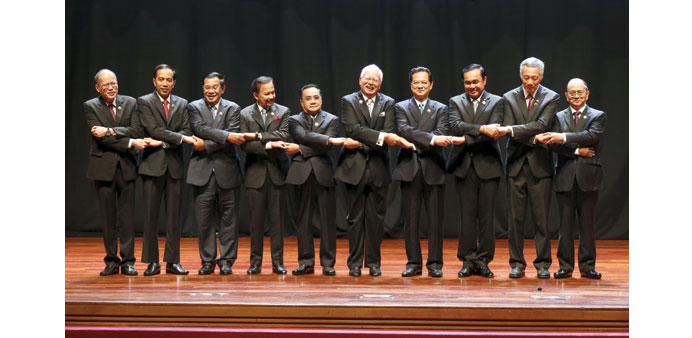Leaders hold hands as they pose for photographs at the opening of the Asean Summit in Kuala Lumpur yesterday. From left: Philippine’s President Benigno Aquino; Indonesia’s President Joko Widodo; Cambodia’s Prime Minister Hun Sen; Brunei’s Sultan Hassanal Bolkiah; Laos’ Prime Minister Thongsing Thammavong; Malaysia’s Prime Minister Najib Razak; Vietnam’s Prime Minister Nguyen Tan Dung; Thailand’s Prime Minister Prayuth Chan-ocha; Singapore’s Prime Minister Lee Hsien Loong and Myanmar’s President Thein Sein. During the summit, Malaysia and Indonesia said they will invest $5mn each in the initial operations of a new joint palm oil body, whose tasks will include stabilising prices and managing stock levels.
Reuters
Kuala Lumpur
Malaysia and Indonesia will invest $5mn each in the initial operations of a new joint palm oil body, whose tasks will include stabilising prices and managing stock levels, the countries announced yesterday.
The council secretariat will be located in Jakarta and its membership will be extended to all oil palm cultivating countries, including Brazil, Colombia, Thailand, Ghana, Liberia, Nigeria, Papua New Guinea, the Philippines and Uganda.
“We must be able to chart the direction of the palm oil industry and, with similar objectives, the industry will continue to prosper the people and especially assist the smallholders,” Amar Douglas Uggah Embas, Malaysia’s plantation industries and commodities minister, told a press conference after the signing of the joint council.
The formation of the new joint council, called the Council of Palm Oil Producer Countries (CPOPC), took place at the Asean summit in Kuala Lumpur and was witnessed by Malaysian Prime Minister Najib Razak and Indonesia’s President Joko Widodo.
Indonesia’s coordinating minister for maritime affairs Rizal Ramli also said both countries will coordinate their respective stock management plans in order to maintain palm’s sustainable prices, and ensure the welfare of smallholders in the industry.
Creating new demand for palm through the biodiesel mandate will help maintain optimal palm stock levels, said Rizal, as the vegetable oil is used for blending into biodiesel.
Malaysia’s palm oil stocks rose to a near 15-year high of 2.83mn tonnes at end-October on an unexpected rise in production, while a Reuters survey estimated Indonesian inventory falling slightly to 3.025mn tonnes from 3.050mn a month ago.
The ministers also announced a proposed framework for sustainable palm oil, taking into account laws and regulations related to the sustainable development of both countries.
The framework, called e+POP, will be benchmarked against other international standards and addresses issues such as the legal requirements for land use and management, industry best practices and protecting the use of primary forests and peatlands from planting.
Malaysia and Indonesia first announced the CPOPC in October with the aim of ensuring further industry cooperation, establishing a global framework for sustainable palm oil, stabilising prices and managing stock levels.
The world’s top two producers, who supply 85% of global palm oil, are trying to tackle various industry challenges from high stockpiles to weak prices and a polluting haze caused by smouldering forest fires.

